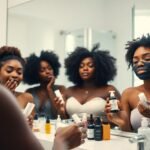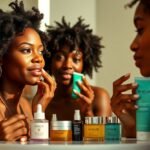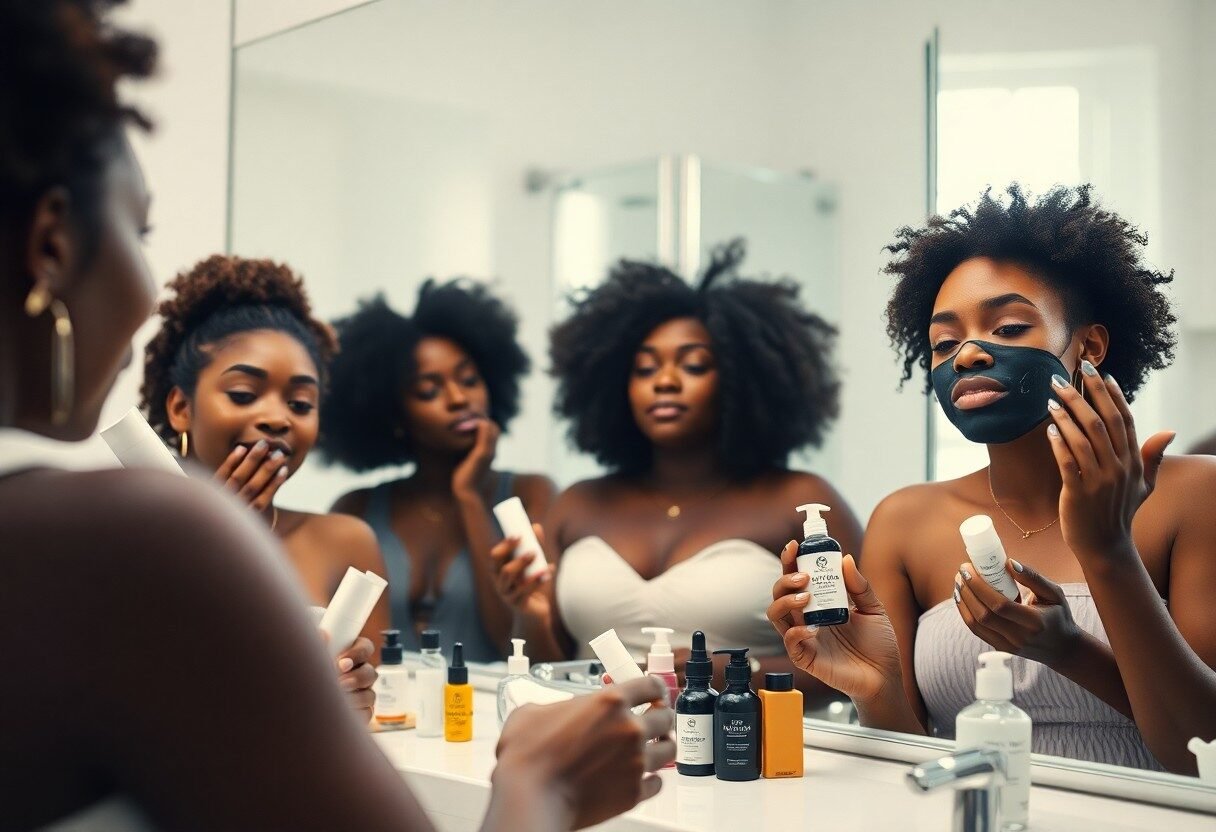
Black skin has unique characteristics that require tailored skincare crucials for optimal health and beauty. I understand the challenges some of us face, from dryness to hyperpigmentation, and it’s vital to choose products that nourish your skin while addressing specific concerns. In this post, I’ll share my go-to recommendations for maintaining radiance and moisture in your skincare routine, empowering you to embrace your natural beauty.
Key Takeaways:
- Understanding your skin type is the first step in selecting the right skincare products.
- Hydration is imperative; opt for lightweight moisturizers that cater to your specific skin needs.
- Incorporate SPF into your daily routine to protect against UV damage and hyperpigmentation.
- Consider active ingredients like vitamin C for brightening and niacinamide for reducing inflammation.
- Regular exfoliation helps to remove dead skin cells and improve skin texture, but choose gentle exfoliants.
- Patch testing new products can prevent adverse reactions and help you find suitable products.
- Consistency in your skincare routine is key to achieving and maintaining healthy skin over time.
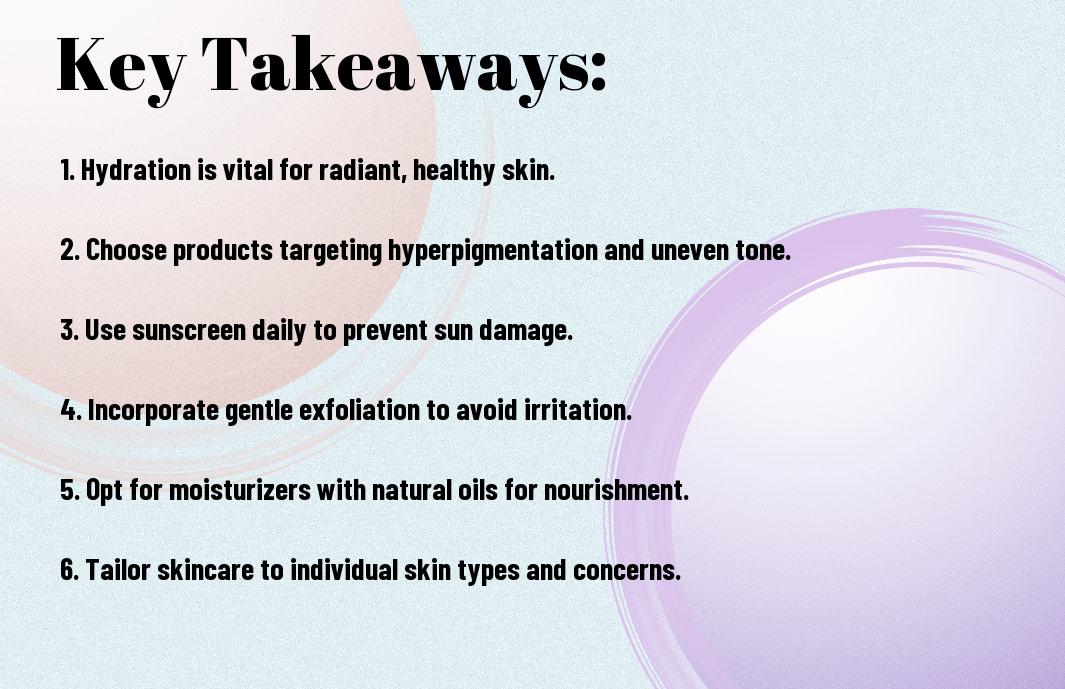
Unique Needs of Black Skin
Black skin possesses distinct characteristics and requirements that often go unrecognized in mainstream skincare. The variation in melanin leads to diverse skin tones, which can affect how your skin responds to products and treatments. Additionally, Black skin typically has a thicker dermis and contains more collagen, making it less prone to wrinkles, but this does not exempt it from issues such as hyperpigmentation or dryness. Understanding these unique needs is crucial for creating an effective skincare routine tailored specifically for you.
Understanding Melanin and Its Impact on Skin
Melanin plays a vital role in the skin’s health, impacting tone, texture, and susceptibility to certain conditions. The varying levels of melanin in Black skin offer some natural protection against harmful UV rays, but this does not negate the need for sunscreen. Excessive melanin production can lead to hyperpigmentation, making it crucial to manage sun exposure and incorporate products that aid in evening out skin tone.
Common Skin Concerns Faced by Black Women
Several skin concerns are prevalent among Black women, including hyperpigmentation, keloids, and dryness. These issues can stem from factors like hormonal changes, genetics, and environmental influences. You may find that certain products enhance moisture retention or target existing dark spots, enabling a brighter, more uniform complexion. Additionally, keloids—often arising from acne or other skin traumas—can be a frustrating aspect of skincare for Black women, requiring tailored treatment options.
For example, hyperpigmentation affects up to 90% of women with darker skin tones at some point in their lives, resulting from inflammation, acne scarring, or sun exposure. Managing these concerns often involves incorporating products with ingredients like Vitamin C or niacinamide, which help to fade dark spots while also promoting overall skin health. Similarly, addressing dryness caused by a lack of natural oils is vital, as this can lead to an uneven texture and heightened sensitivity. Understanding these common issues ensures that your skincare regimen is equipped for success.
Essential Ingredients for Radiant Skin
In my quest for radiant skin, I’ve discovered that certain ingredients deliver remarkable results, especially for black women’s unique skincare needs. The right combination of moisturizers, exfoliants, and protective agents can transform your skin. Ingredients such as shea butter, jojoba oil, and vitamin E not only hydrate but also nourish the skin, while effective exfoliants refine texture without causing irritation. Tailoring your regimen to include these vitals is key for achieving that coveted glow.
Key Natural Ingredients for Moisturization
Natural moisturizers play a vital role in maintaining healthy skin. I often recommend shea butter, known for its deep hydration and soothing properties. Another favorite is jojoba oil, which mimics the skin’s natural oil, allowing for better absorption without clogging pores. Additionally, aloe vera is incredible for its light texture and cooling effects. Incorporating these natural ingredients ensures your skin stays moisturized and balanced.
| Shea Butter | Deeply hydrates and soothes skin |
| Jojoba Oil | Mimics skin oil for better absorption |
| Aloe Vera | Light texture; cooling effects |
| Coconut Oil | Locks in moisture with anti-inflammatory benefits |
| Honey | Natural humectant; promotes healing |
Effective Exfoliants Tailored for Darker Skin Types
Exfoliation is a game-changer for maintaining smooth, radiant skin, especially for darker skin tones that can be more prone to hyperpigmentation. I find that AHAs, like glycolic acid, work wonders for chemical exfoliation, while gentle physical exfoliants with fine granules effectively remove dead skin. These exfoliants help to promote cell turnover, thus preventing the build-up of dead skin which can lead to uneven texture. Additionally, regular exfoliation can minimize the appearance of dark spots. Tailoring your exfoliant to your skin’s needs is a key step in fostering a vibrant, even complexion.
| Glycolic Acid | AHAs for effective chemical exfoliation |
| Salicylic Acid | Helps with acne and unclogs pores |
| Rice Powder | Gently polishes skin; suitable for sensitive skin |
| Fruit Enzymes | Natural exfoliation for brighter skin |
| Fine Cornmeal | Natural physical exfoliant; boosts radiance |
I personally ensure my exfoliation routine includes the right balance to keep my skin fresh and glowing. The combination of acids and gentle exfoliating materials can make a significant impact on how your skin looks and feels.
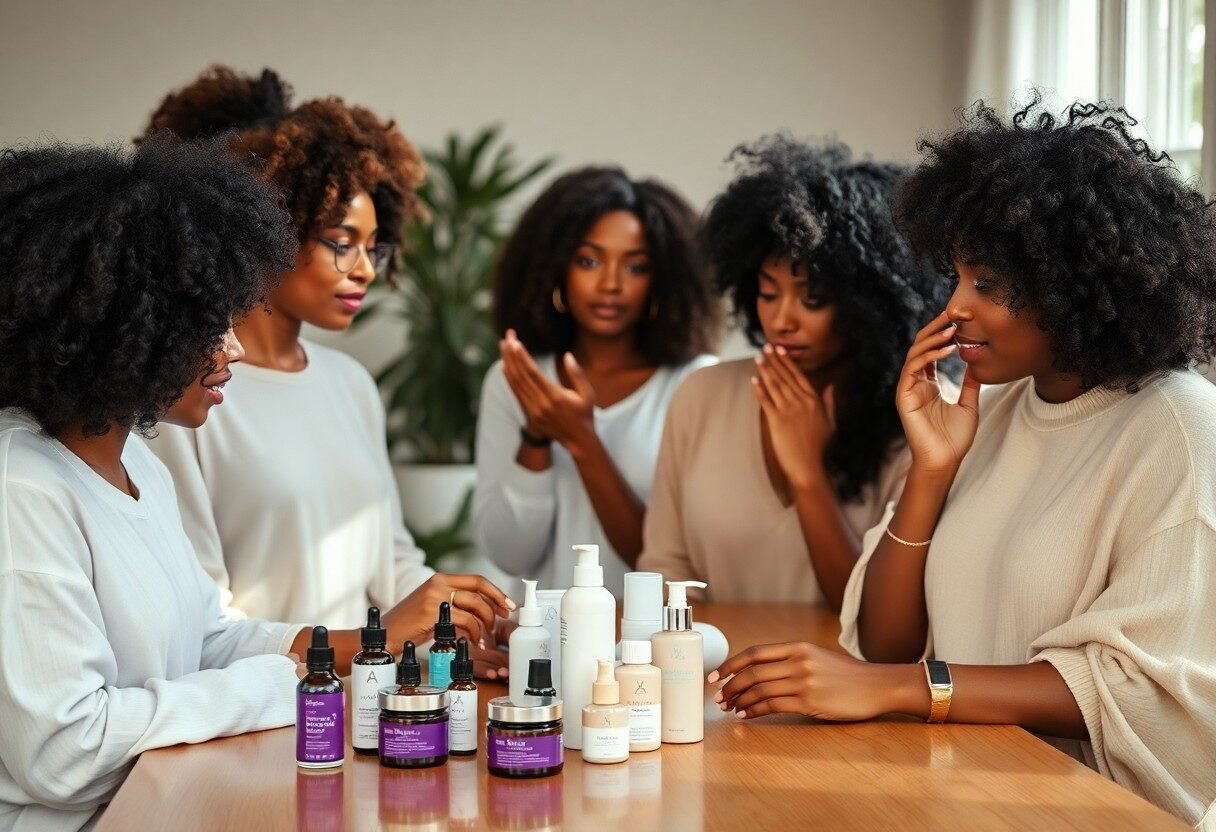
The Role of Sun Protection in Skincare
Embracing a solid sun protection routine is non-negotiable for maintaining healthy skin. UV rays can penetrate various skin tones, leading to issues such as hyperpigmentation and premature aging. Black skin is not immune to sun damage, as the *melanin* it contains offers some natural protection but doesn’t completely block harmful rays. Incorporating sun protection methods ensures your skin stays radiant and free of potential damage over time.
Importance of Sunscreen for All Skin Tones
Sunscreen is vital for everyone, regardless of skin tone. While darker skin has more *melanin*, which provides a degree of protection from UV radiation, it still can suffer from damage leading to *hyperpigmentation* and skin cancer. Therefore, using sunscreen daily is vital for preventing skin issues and preserving the skin’s natural radiance.
Recommended SPF Products for Black Women
Selecting the right SPF products can make a world of difference in your skincare routine. I’ve personally found that broad-spectrum sunscreens with at least SPF 30 work wonders. Look for products that remain lightweight and non-greasy to avoid clogging pores. Brands like Black Girl Sunscreen and Supergoop! offer options tailored to darker skin tones.
Among the recommended products, Black Girl Sunscreen SPF 30 stands out with its nourishing ingredients, such as *avocado oil* and *jojoba oil*, designed specifically for melanin-rich skin. Its sheer formula blends effortlessly, leaving no white cast. Alternatively, Supergoop!’s Unseen Sunscreen also receives rave reviews for its weightless finish and versatility, making it perfect for wearing under makeup. Choosing sunscreens like these ensures that you effectively shield your skin from damaging UV rays while also complementing your skincare and beauty routine.
Nighttime Routines that Transform Skin
A well-structured nighttime routine can dramatically enhance your skin’s health and appearance while you sleep. As your body naturally repairs itself, using targeted treatments can facilitate this process, ensuring you wake up with revitalized, glowing skin. Consistency is key; applying your products in the right order can optimize their effectiveness. Cleanse, treat, moisturize, and protect to unlock the transformative power of your beauty sleep.
The Science Behind Overnight Treatments
Overnight treatments leverage the body’s natural circadian rhythm, allowing reparative ingredients to work synergistically with your skin’s nighttime rejuvenation process. During sleep, skin permeability increases, enhancing absorption of active ingredients like retinol, hyaluronic acid, and various antioxidants. This biological window is when skincare truly excels, promoting cell turnover, hydration, and collagen production.
Recommended Products for Nighttime Care
A few standout products can elevate your nighttime regimen. I personally love incorporating ceramide-rich moisturizers like CeraVe PM Facial Moisturizing Lotion, which hydrates and restores the skin barrier. Adding a delicate layer of Niacinamide serum such as The Ordinary Niacinamide 10% + Zinc 1% can help reduce inflammation and uneven skin tone. To combat signs of aging, a nightly application of retinol, such as Differin Gel, can lead to impressive results over time.
When selecting these products, consider your specific skin needs. If hydration is a priority, look for creams packed with shea butter or squalane to lock in moisture. For blemish-prone skin, salicylic acid or benzoyl peroxide serums can effectively work overnight to clear breaks and prevent future acne. It’s necessary to patch test any new products and gradually introduce them to avoid overwhelming your skin.
Culturally-Inspired Practices for Healthy Skin
Embracing culturally-inspired practices can elevate your skincare routine. Traditional techniques, passed down through generations, celebrate ingredients and rituals that resonate with the skin’s needs. From African shea butter to Caribbean coconut oil, these natural elements harness moisture and nourishment. Incorporating these methods fosters a deeper connection to heritage while effectively addressing your skin concerns, making them invaluable for sustainable beauty.
Traditional Remedies and Their Modern Adaptations
Many traditional remedies have found their way into contemporary skincare routines, bridging generations of wisdom with modern science. For instance, the use of aloe vera as a soothing agent has expanded from ancient African traditions to become a staple in today’s moisturizing products. Additionally, recipes for herbal infusions, like green tea and rooibos, now flourish as potent antioxidant boosters in serums. You can easily adapt these time-honored practices to suit your lifestyle, enhancing your skin’s health.
The Influence of Diet on Skin Health
Your diet plays a fundamental role in skin health, impacting everything from hydration to breakouts. Ingredients rich in vitamins A, C, and E, alongside omega-3 fatty acids, can dramatically improve skin texture and tone. Foods like sweet potatoes, avocados, and fatty fish help nourish your skin from the inside out, ensuring it looks vibrant and youthful.
Studies indicate that a diet abundant in antioxidants can help reduce inflammation and oxidative stress, key factors in skin aging and acne. For instance, a 2018 study highlighted that individuals consuming higher levels of colorful fruits and vegetables experienced significant improvements in their skin’s elasticity and overall appearance. Incorporating specific foods, such as berries, nuts, and leafy greens, can promote a clearer complexion while combating dryness and uneven skin tone. Prioritizing a balanced diet rich in these elements powers your skincare routine, ensuring lasting radiance and health.
Final Words
Ultimately, embracing a skincare routine tailored for Black women’s unique skin needs is empowering and indispensable for achieving healthy, radiant skin. I’ve shared important products and tips that can help you navigate this journey with confidence. By understanding your skin type and its specific requirements, you can foster a daily regimen that enhances your natural beauty. Prioritize self-care, stay consistent, and invest in quality products that resonate with your skin’s needs. Your skin deserves the best, and with the right approach, you can shine bright every day.
FAQ
Q: What are the best skincare products for Black women?
A: The best skincare products for Black women typically include moisturizers that contain hyaluronic acid and shea butter, serums with vitamin C for brightening, and gentle cleansers that do not strip the skin of its natural oils. It’s also important to include sun protection in your daily routine, as UV rays can still affect melanin-rich skin. Look for products specifically formulated for your skin type—whether oily, dry, or combination.
Q: How can Black women deal with hyperpigmentation?
A: Hyperpigmentation is a common concern and can be addressed with targeted treatments. Ingredients like hydroquinone, retinoids, and niacinamide can be effective in reducing dark spots. Consistent use of sunscreen is also vital to prevent further darkening. It’s best to consult with a dermatologist to create a personalized skincare regimen for managing hyperpigmentation.
Q: Is it necessary for Black women to use sunscreen daily?
A: Yes, daily sunscreen use is vital for everyone, including Black women. While darker skin has more melanin that offers some natural protection against UV rays, it is still susceptible to sun damage, aging, and hyperpigmentation. A broad-spectrum SPF of 30 or higher is recommended, and reapplication every two hours is important if you are outdoors for extended periods.
Q: What ingredients should Black women look for in moisturizers?
A: Black women should look for moisturizers containing hydrating ingredients such as glycerin, hyaluronic acid, and natural oils like jojoba or olive oil. These ingredients help maintain moisture balance and improve skin texture. Additionally, ceramides can help to strengthen the skin barrier, which is important for overall skin health.
Q: Are there any specific challenges Black women face with their skin?
A: Black women may face unique challenges like hyperpigmentation, keloid scarring, and dryness. Because of the thicker dermis, conditions like acne may also lead to more pronounced dark spots. Understanding these specific challenges is important to tailor skincare routines and choose suitable products that address these concerns effectively.
Q: How can Black women take care of their skin during seasonal changes?
A: During seasonal changes, Black women should adjust their skincare routines accordingly. In colder months, it may be necessary to switch to richer creams and oils to combat dryness. In the summer, lighter gels and oil-free products may be more appropriate. Incorporating exfoliation into the routine can also help to remove dead skin cells and promote a more radiant complexion.
Q: Should Black women invest in professional skincare treatments?
A: Professional skincare treatments can be beneficial for Black women, especially if dealing with specific issues like acne, hyperpigmentation, or aging. Treatments such as chemical peels, microdermabrasion, or laser therapy can help improve skin texture and tone. It is vital to choose a professional experienced in working with melanin-rich skin to avoid adverse effects.
